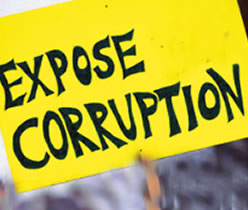Volunteering information, major ingredient towards corruption fight – GII
 Volunteering information to the appropriate state and non-state actors on acts of corruption will accelerate the fight against the canker in the country, the Ghana Integrity Initiative (GII) a non-partisan, non-profit civil organization has stated.
Volunteering information to the appropriate state and non-state actors on acts of corruption will accelerate the fight against the canker in the country, the Ghana Integrity Initiative (GII) a non-partisan, non-profit civil organization has stated.
According to GII, the fight against corruption is a national issue, hence, the need for the citizenry to voluntarily blow the whistle on any act of corruption to the right institutions for the necessary investigation and possible prosecution.
Mr Michael Boadi, GII Fund-raising Manager was speaking at the 12th monthly stakeholder engagement seminar organised by the Ghana News Agency Tema Regional Office.
The stakeholder engagement is a platform rolled out for state and non-state actors to address national issues.
The monthly engagement also serves as a motivational mechanism to recognize the editorial contribution of reporters towards national development in general and the growth and promotion of the Tema GNA as the industrial news hub.
Speaking on the topic: “Is the fight against corruption a mirage or reality?” Mr Boadi explained that the fight against corruption to be a mirage or reality would depend on the active participation of the citizenry by providing tip-offs and shunning the act.
He said the act of corruption is perpetuated across the breadth and width of the country; hence they require national solutions.
Mr Boadi added that the country has been working to mitigate the pernicious effects of corruption in the various public and corporate institutions.
He said: “Ghana has made several efforts over the years through religious leaders being used to preach on morality, public execution of corrupt officials, formulation of draconian laws against act of corruptions, public sector reforms, and review of legislation.”
He said other state acts against corruption include the enactment of the public procurement laws, the anti-money laundering law, the whistle-blowers’ act, the financial administrative act, and the Asset Declaration Law.
He said the state had also empowered bodies such as the Commission on Human Rights and Administrative Justice (CHRAJ), EOCO, and the establishment of the Office of the Special Prosecutor among other key interventions over the years.
He said despite the efforts the government must make inroads to route-out corruption, improve the management of its public finance, and make its procurement system more transparent to reduce the colossal misappropriations of public funds that come out after the Annual Auditor General’s Report.
He said while speed is understandable, without proper controls it exposes governments to a variety of corruption risks that may undermine the effectiveness of their responses.
He noted that corruption is an abuse of entrusted power for private gains which could lead to theft, wastage, and misuse of scarce resources.
He stated that it could impede investment, with consequent effects on growth and jobs noting that the country’s ability to make corruption a high-risk activity to engage in would ensure that human and financial resources are used efficiently to attract more investment and grow the country more rapidly.
Mr Boadi said reform efforts and progress could be achieved through better and more open processes, professional accountability systems, and the use of the latest advanced technologies to capture, analyse, and share data to prevent, detect, and deter corrupt behaviour.
Mr Francis Ameyibor, Ghana News Agency Tema Regional Manager, entreated both public and private institutions to partner effectively with the media in their programmes and activities to prevent the incidence of corruption.
He urged stakeholders in the public service to step up the fight against corruption.
Mr Ameyibor explained that the role of the media was critical in promoting good governance and controlling corruption.
“The fight against corruption will bear little fruit without the media raising the awareness of public officials and the general public to the dangers of corruption and the duty of every citizen to combat corruption.
He urged the media to collaborate with anti-corruption bodies at the national, regional, and district levels and entreated them to be bold in publishing information about corrupt officials and be prepared to name and shame without compromise.
Source: GNA
